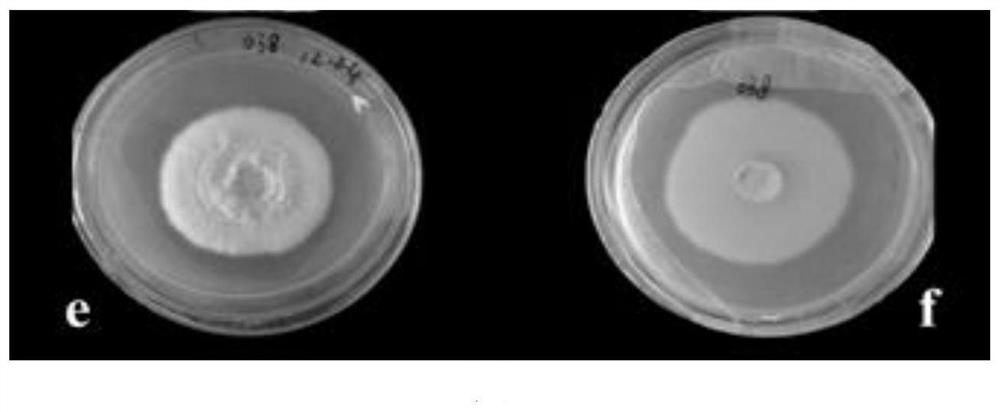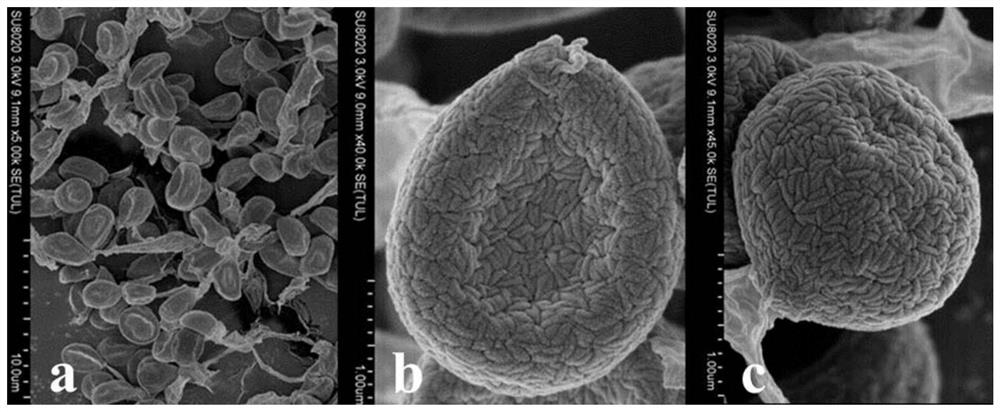Synergistic control of Beauveria bassiana sb038 and spinosad against common thrips
A technology of spinosad and Beauveria bassiana, applied in the directions of insecticides, biocides, botanical equipment and methods, etc., can solve problems such as resistance and insignificant efficacy, and achieve good control effects, Delay the occurrence and development, good control effect
- Summary
- Abstract
- Description
- Claims
- Application Information
AI Technical Summary
Problems solved by technology
Method used
Image
Examples
Embodiment 1
[0025]Example 1 Screening of high virulence strains
[0026] 1.1 Test insects
[0027] Ordinary thrips were harvested from cowpea fields in Zhucun, Zengcheng District, Guangzhou City, Guangdong Province in 2017. After harvesting, they were reared with cowpea pods in RXZ-500C intelligent artificial climate box (Ningbo Jiangnan Instrument Factory) under the temperature (26 ±5)℃, light cycle 12L:12D, relative humidity (70±5)%.
[0028] 1.2 Test strains
[0029] The strains listed for screening belong to Beauveria bassiana bacteria, and they are all preserved in the Engineering Research Center of the Ministry of Education for Biological Control, South China Agricultural University, as follows: SP433, SB036, SB062, SB037, SB015, SB063, SB051, SB041, SB004, SB043, SP016, SB038, SB050, SB006.
[0030] Of these, a deposit of biological material for patent procedures was also carried out for SB063 and SB038. Among them, another patent application will be filed for the content of th...
Embodiment 2
[0052] Example 2 Identification of strain SB038
[0053] (1) Collection of strain SB038
[0054] Strain SB038 was originally isolated from the soil of Zhengxiangbaiqi, Xilingol League, Inner Mongolia Autonomous Region in 2009, and is a native strain in China.
[0055] To collect soil samples, take about 100g of soil 10-15cm below the topsoil, pack them in plastic bags and bring them back to the laboratory for processing. The soil samples were sieved to remove stones and sundries, then 10g of pure soil was suspended in 90mL of 0.1% Tween-80 solution, shaken, and allowed to stand for 15min, and 2mL of the supernatant was diluted in 8mL of 0.05% Tween-80. , formulated as a soil suspension. Inoculate 0.1 mL of soil suspension on the red Bengal agar medium plate, push the suspension evenly under the surface of the plate with a triangular glass scraper, incubate at 25 °C for 3-7 days, then use an inoculating loop to cut out a single colony and inoculate it on a PDA plate Continue...
Embodiment 3
[0077] Embodiment 3 Toxicity determination of different pesticides to common Thrips
[0078] The pesticide film method was used to prepare pesticides with different concentration gradients. A 5cm centrifuge tube (pierced) was soaked in the liquid for 2 hours, and 1cm of beans (with no holes at both ends) were soaked in the liquid for 10s, dried naturally, and then picked. 20 female adults of common thrips were placed in a centrifuge tube with beans, and 4 replicates of each concentration were raised in an incubator, observed for 2 days, and their mortality was recorded.
[0079] SPSS19.0 software was used to process and analyze experimental data, and one-way analysis of variance was used to analyze the toxicity results of biological / chemical pesticides on thrips, and Tukey's test was used to test the significance of differences to screen high-toxicity pesticides.
[0080] The results showed that the corrected mortality rate of common thrips increased with the increase of the con...
PUM
 Login to View More
Login to View More Abstract
Description
Claims
Application Information
 Login to View More
Login to View More - R&D
- Intellectual Property
- Life Sciences
- Materials
- Tech Scout
- Unparalleled Data Quality
- Higher Quality Content
- 60% Fewer Hallucinations
Browse by: Latest US Patents, China's latest patents, Technical Efficacy Thesaurus, Application Domain, Technology Topic, Popular Technical Reports.
© 2025 PatSnap. All rights reserved.Legal|Privacy policy|Modern Slavery Act Transparency Statement|Sitemap|About US| Contact US: help@patsnap.com



